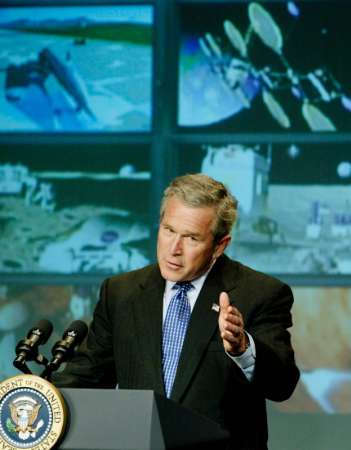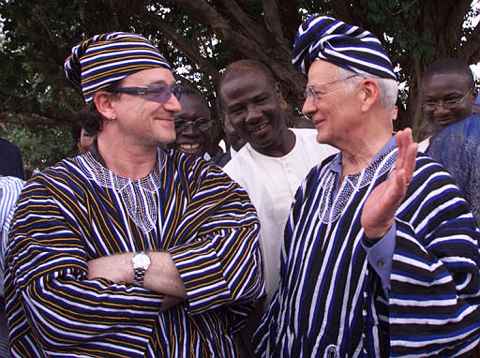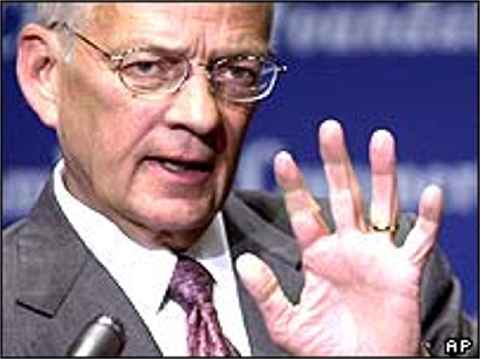O'Neill Bombshell: How Damaging?
by JohnHuang2
In a bombshell revelation that has Washington reeling in shock, former Treasury Secretary Paul O'Neill told CBS News that Bush was no great admirer of Saddam Hussein, with the President even hinting sinisterly the ousted Iraqi leader was a 'bad person.' (O'Neill memo to Bush: Saddam had enough enemies already! He didn't need another one!)
Oddly enough, "from the very beginning, there was a conviction that Saddam Hussein was a bad person" and that this 'bad person' "needed to go," even before the terrorist attacks of Sept. 11, a flabbergasted O'Neill, the main source for a new book, told "60 Minutes" in an interview aired Sunday. (Saddam gassed thousands, raped and pillaged, invaded neighbors, aided terrorism, plotted Bush (41's) failed assassination; just who in their right mind would suspect Saddam's a bad person anyway?)
Even more damning, the White House appeared to believe Saddam was a threat to peace and stability before 9/11. (About Saddam, Bush should keep his unfair opinions to himself! What's Bush thinking, he's Treasury Secretary or somethin'?) O'Neill, a threat to peace and stability in the market before and after 9/11, shockingly added that the White House had contingency plans for a possible U.S. invasion of Iraq, accusing the President of not ignoring the threat of terrorism and developing a winning strategy to deal with it from the get go, among other very damaging allegations. (After the U.N. gave Saddam only 12 years to turn a new leaf, Bush took only 2 years to rush to war). More damning still, credible reports suggest the Bush White House plot against Saddam predates the Bush White House, with 'Regime Change' having been U.S. policy since 1998 -- indicating Bush's nefarious influence, as governor of Texas, reached deep into the Clinton administration and Congress, which mandated Regime Change that year. All of this plotting and scheming by Bush falls right in line with Bush being completely disengaged, detached, passive, lethargic, and really, really dumb -- as O'Neill depicts him. (During Cabinet meetings in the Clinton White House, I bet Bush was like a blind man in a roomful of deaf people).
On "60 Minutes," O'Neill recalls his first Cabinet meeting with Bush this way: "I went in with a long list of things to talk about and, I thought, to engage (him) on...it turned out to be me talking and the president just listening." (O'Neill then spends the next 2 years just listening to the President talk non-stop about his plan to invade Iraq, enough to fill 19,000 pages of documents. Or are these the same documents Howard Dean sealed up in Vermont?)
As Treasury Secretary for 23 rocky months, O'Neill recalls seeing no convincing evidence that Saddam possessed WMD. (For 23 rocky months, I recall seeing no convincing evidence the U.S. possessed a Treasury Secretary).
 |
That said, I'll confess the "60 Minutes" interview was devastating. Sorry -- I'm not going to paper over this, nor coat it with candy. O'Neill shows how a crucial gap in intelligence could lead to misguided thinking on Iraq. Where was this crucial intelligence gap, precisely? From the interview, I concluded the intelligence gap was the empty space between O'Neill's ears. Small wonder Bush canned him. (When O'Neill heard the Mars Rover had landed, he probably called it 'a really huge leap -- the notion that the U.S. has the unilateral right to do whatever we decide to do.' If book sales falter, brace for his next shocker: How Bush began planning to invade Mars within days of taking office. In a related note, Wesley Clark may have questioned why the Mars probe could not be conducted from 15,000 ft. up and Howard Dean may have wondered whether this was predicted in the Old or New Testament and Al Sharpton may have questioned why no signs of blacks nor Hispanics on a planet of color (red) and Dennis Kucinich may have hoped to gain momentum from this tour of his homeland. I'd wager John F. Kerry may have checked to see if Dean ever spoke in support of legislation giving Bush authority to invade Mars. Joe Lieberman may have wondered whether the Rover was Al Gore in a flight suit).
 |
Perhaps most damning of all, O'Neill claims to have seen irrefutable evidence that politics played a role in the Bush White House, which came as a terrible shock to O'Neill, a veteran of the Nixon and Ford administrations. His experience with Bush may have scarred O'Neill for life. He has not adjusted well. To relieve the emotional upheaval of seeing politics occur in Washington, O'Neill talked to former Wall Street Journal reporter, Ron Suskind, author of a new book, The Price of Loyalty, offering up those 19,000 documents. "The biggest difference between (Nixon-Ford) and (Bush-Cheney) is that our group -- (Nixon-Ford) -- was mostly about evidence and analysis," whereas the Bush people seem "mostly about politics," O'Neill told Mr. Suskind. Clearly, other than Watergate, Enemies lists, the Plumbers, wage and price controls, Kissinger's 'Peace in our time,' nixing Bretton Woods, etc., politics was something that never happened in the Nixon and Ford administrations.
 |
On Bush's policy of tax cuts, O'Neill took a dim view, accusing Bush of fiscal irresponsibility. (I wouldn't too quickly dismiss O'Neill's economic credentials, though. Recall all the jitteriness as investors watched the DOW plummet in '02? To reassure the markets, O'Neill launched an African AIDS awareness tour with Bono, traveling the whole of Africa. The DOW leapt 25 percent afterwards -- in the 12 months since Bush sacked him for such outstanding work. (From the beginning, there was a conviction in the market that O'Neill was a bad person for the job and that he needed to go).
O'Neill says his 'going public' has nothing to do with being a bitter and disgruntled former employee; he has no ax to grind, no hard feelings for being forced from his post summarily -- really! (Next he'll say he began planning to remove himself from office days after taking office. To be fair, O'Neill has grounds for complaining: Saddam had 24 years before being ousted for screwing things up; O'Neill had 23 months before being ousted for screwing things up).
Shocked at evidence Bush early on considered using force to topple Saddam (even planning for the postwar), Democrats jostling for their party's presidential nomination were quick to pounce.
 |
(Facing a backlash, O'Neill said Tuesday he didn't really mean all that stuff about Bush being blind and that he didn't really mean there was anything wrong with contingency planning for possible war with Iraq and that he didn't really mean to use "vivid" language quoted in the book and that he didn't really mean to imply he would not vote for Bush in November. "I don't see anyone who is better prepared or more capable" than Bush, he told NBC's "Today" show, adding that the whole thing was just some big misunderstanding -- really! -- and that if he "could take it back," he "would take it back," referring to the blind man quote. He also denied any classified documents were used -- the subject of a new Treasury Department probe -- or that he doesn't think so, or that he doesn't think so but can't be sure because he never even checked the material before giving it to Mr. Suskind. He denied taking any agency documents. "The truth is, I didn't take any documents at all," he told Katie Couric. The spine-chilling truth is that these documents were stalking O'Neill. That's right. Everywhere he went, the documents followed. All 19,000 pages. I hate when that happens!)
Massachusetts Sen. John F. Kerry, who served in Vietnam, called the charges "very serious," noting that the "White House needs to answer these charges truthfully because they threaten to shatter (its) already damaged credibility as never before" -- even stretching back to the days when John F. Kerry served in Vietnam. Evidence of an early invasion and postwar plan shows that "the American people were presented with misleading or manufactured intelligence," said Howard Dean. Evidence of an early invasion plan and extensive postwar planning is damning enough, but Democrats also complain the White House lacked an adequate invasion plan and pursued no extensive postwar planning.
At a news conference Monday at Monterrey, Mexico, Bush noted that "Like the previous administration, we were for regime change."
Any questions?
Anyway, that's
My two cents...

|
|
|
|
|
|
|
|
|
|
